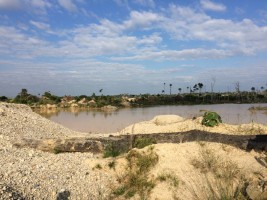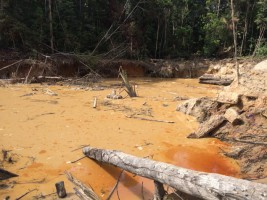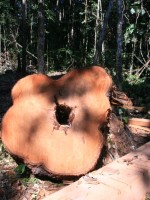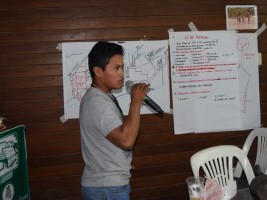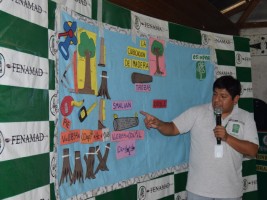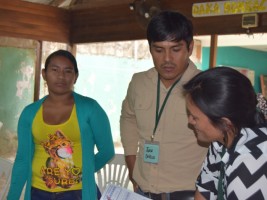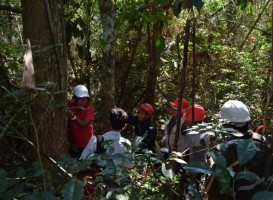Forestlink: Real-time monitoring to empower indigenous communities to protect the Amazon rainforest
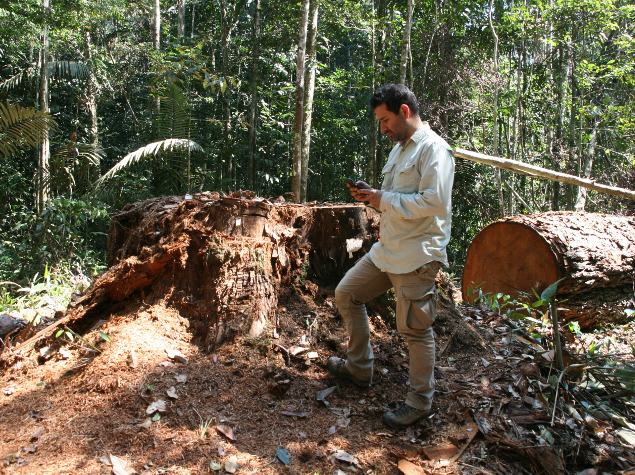
The Madre de Dios, in southern Peruvian Amazon, is considered Peru’s richest region in terms of biodiversity, mostly covered by protected areas and occupied by various indigenous communities. However, this region faces enormous threats from illegal logging and mining. Unsustainable logging precipitates a breakdown of forest habitat which undermines indigenous livelihood’s systems. Illegal miners who often invade community lands and destroy forest and riverine ecosystems, dump highly toxic mercury and cyanide tailings directly into rivers and streams.
Despite the encouraging institutional set up, the national authorities do not have the means and mechanisms in place to control extractive companies’ operations. Local authorities often lack the political will or are involved in corruption networks. Furthermore, communities do not have the resources to alert authorities on time and are left alone on the frontline of forest protection. This situation creates an environment of distrust and has opened a gap between authorities and communities and led to serious social conflict in many areas of the Amazon. During the last eight years, indigenous communities have been implementing forest monitoring programs, with support from local and regional indigenous organizations. These community-based monitoring systems have demonstrated successful results in terms of community empowerment and reporting of illegalities. However, the lack of technical solutions and proper equipment to collect, systematize, transmit, process and analyze monitoring data, and the insufficient engagement with national and local authorities, have all limited the effectiveness of such initiatives.
The project objective is to improve Amazonian indigenous peoples’ capacities to protect their forest, strengthen their institutions and liaise with relevant authorities to bolster forest protection and governance and contribute to climate change mitigation.
FONDATION ENSEMBLE SUPPORTED A FIRST TIME THIS PROJECT IN 2016:
Results from the first phase:
Technical development of the appropriate applications and equipment to enhance real-time monitoring technology and adapt it to indigenous communities in the Amazon
- The Rainforest Foundation UK platform (RFUK) (especially the data collection/reporting interface on handheld devices) is configured in terms of reporting fields and cultural appropriateness
- The type and the quality of the equipment is adapted to the local situation
Support and enhance indigenous community-based forest monitoring programmes with real-time monitoring technology to monitor and report forest illegalities
- 24 indigenous forestry monitors were trained in the use of real-time monitoring technology
- An incident verification system was established with FENAMAD who also verify the alerts, with the police in key cases
Engage with national and regional forest and environmental governmental bodies to develop appropriate mechanisms for verification and enforcement of forest illegalities and integrate community-based forest monitoring programmes through official monitoring actions.
- A collaborative framework was established between FENAMAD, AIDESEP and relevant authorities, through a Memorandum of Understanding, such as the Air Force (FAP), SERFOR (National Forestry Service) and OSINFOR (Forest Resources Supervision Agency)
- 80% of verified illegalities trigger enforcement actions: the project has made good progress in triggering verification and control missions by relevant authorities (police and environmental prosecutor)
Building the business case for scalability, formal recognition and financial sustainability of community-based forest monitoring programmes in local and/or national programmes.
- The real-time monitoring system was adapted for oil monitoring in the Loreto region with the adaptation of the application to follow the form of the Environmental Assessment and Enforcement Body (OEFA), the online platform is operational and FEDIQUEP staff was trained on the use of ForestLink.
The project results and the case to support community-based monitoring have been presented to the Ministry of Environment; the Veeduría model has been presented and promoted to SERFOR, IUCN, and to international cooperation actors and a scale-up plan has been prepared.
THE FOUNDATION IS SUPPORTING THIS PROJECT FOR A SECOND TIME IN 2019:
Since then, the project has been extremely successful, resulting in the destruction of 83 pieces of equipment and 23 camps used in illegal mining operations. The value of the equipment destroyed has been estimated at more than £1.5 million ($2 million). This initiative is among the very few that are actually tackling the problem of illegal mining and logging directly.
The aim now is to consolidate the achievements of the Forestlink project in Peru and to ensure its scalability and sustainability, by:
- Extending Forestlink to new communities in Madre de Dios who are heavily affected by illegal mining and logging, have very little capacity to monitor and control their lands, and have expressed their willingness and desire to use Forestlink;
- Improving control and enforcement mechanisms and consequently further reducing illegal logging and mining in Madre de Dios region;
- Ensuring sustainability of control actions by authorities in partnership with indigenous communities.
The project will target 17 communities located in four key river basins in the Madre de Dios region of Peru, representing an area of more than 280,000 hectares of forest that will potentially be protected from illegal activities.
Final summary report (September 2022):
Within this second phase of the project, RFUK and FENAMAD managed to extend Forestlink to 8 new communities, gathering a total of 18 indigenous communities involved in this near real time monitoring in the region of Madre de Dios, heavily affected by illegal mining and logging. A total of 48 monitors were trained during the project duration and 28 (including 8 women) were officially recognized by SERFOR (National Forestry Service) as forest custodians in a workshop organized by FENAMAD in May 2022, which is a major achievement. Monitors from all 18 communities are effectively reporting using the system and are carrying out monitoring missions at least once a month. Security protocols were developed and local FENAMAD staff was trained to minimize risks during and following interventions, as it has become clear that more safety is needed in a context where threats to environmental defenders are ever growing, globally and in Peru particularly.
One of the challenges of this second phase was to improve law enforcement mechanisms. 6 enforcement missions took place out of 8 cases in total in Boca Pariamanu, El Pilar, Barranco Chico, Turbina, Palma Real as well as one legal resolution in favor of the community of Puerto Nuevo. Obtaining support from a lawyer during 2021 was key to push several of these cases through the legal system. Prosecution has been very limited though, due to the involvement of some prosecutors in criminal networks (early 2022, the governor of Madre de Dios was even put in preventive prison for his alleged links to organized crime networks). However, with the change of government and thanks to continued legal capacity within FENAMAD, key cases are progressing. A notable success for the project, through legal and advocacy actions, was the legal cancellation of a concession granted to a logging company, obtained by FENAMAD in November 2021. Intelligence gathered with ForestLink and project support was essential to achieve this. To ensure sustainability of control actions by authorities, in partnership with indigenous communities, a financial strategy was developed and a concrete proposal submitted to the government to support ForestLink through the National Forest Protection Program of the Peruvian Ministry of Environment which is currently supporting the costs of half of the communities’ monitoring.
Finally, the project supported FENAMAD in improving gender equality within the organization and the communities. A survey on sexual and reproductive health was completed in 2021 and the results were used by FENAMAD to develop its gender strategy, approved in its annual assembly in October 2021, after several rounds of revision and improvement. At the end of the project, it could be noticed that more and more indigenous women are taking leadership: of the 18 communities participating in the project, 4 are chaired by women and the Board of Directors of FENAMAD is made up of 4 men and 2 women, which is an important improvement compared to the situation prior to first phase of the project in 2016.
To find out more on the Forestlink Technology:
Another video about the project:

Devastated wetlands by illegal mining next to Puerto Luz community
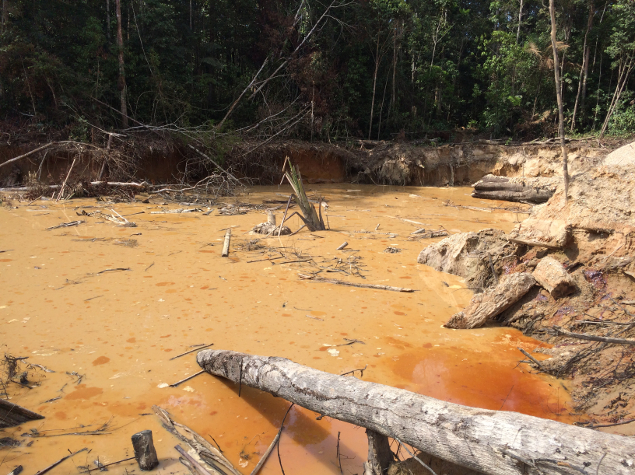
Impact of illegal logging and mining in indigenous communities of Madre de Dios
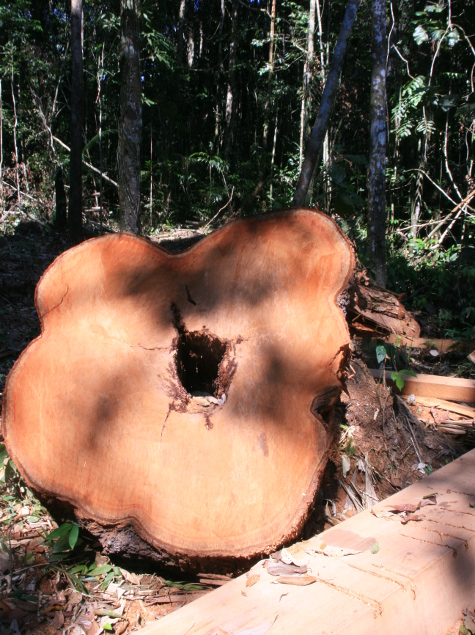
Impact of illegal logging and mining in indigenous communities of Madre de Dios

Presentation of monitor in the training workshop

Forestry authority training on measuring logs
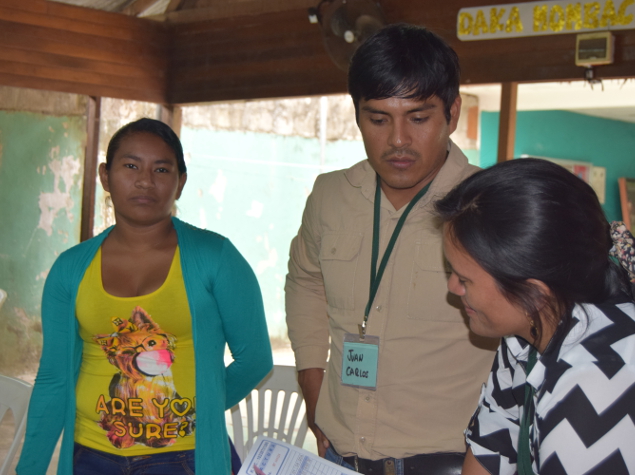
Indigenous monitors training workshop
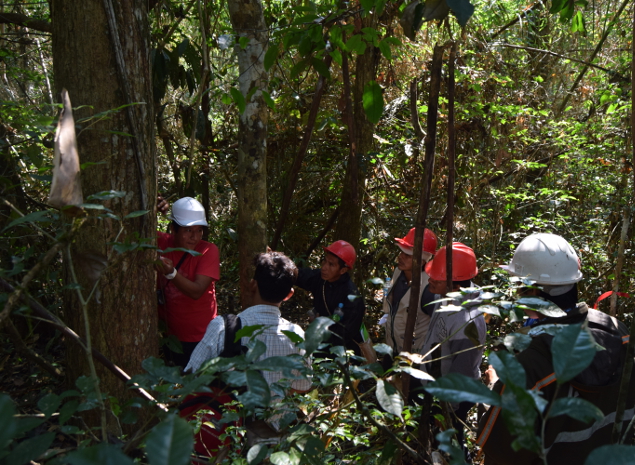
Indigenous monitors training
